* ABC 7…
An I-Team data investigation of racial disparities in Chicago Police Department traffic stops shows Black drivers are far more likely to be stopped by Chicago Police than white drivers. New evidence also shows Black drivers are more likely to be pulled over for no reason at all.
Chicago Police officers stopped 598,332 drivers in 2019 - that’s more than 1,600 traffic stops a day citywide. In collaboration with other ABC Owned Stations, our analysis of police data shows Black drivers make up a greater proportion of Chicago traffic stops than their proportion of the population, meaning a simple trip to work or the store can often lead to police contact. As a result, Black drivers tell the I-Team they often feel targeted behind the wheel. […]
In 2019, Chicago police stopped 368,332 Black drivers - more than six in 10 of all traffic stops citywide. But when you factor in the greater number of white drivers on the roads than Black drivers, the racial disparity is even worse. […]
The number of traffic stops in Chicago is significantly increasing. In 2014, Chicago police only pulled over 87,355 people. Last year alone they pulled over a half a million more drivers than five years ago.
As the number of police stops increase and police continue to stop Black drivers at a far greater rate, our data analysis shows they’re actually citing Black drivers less often than white drivers. That means while Black drivers are more likely to be pulled over, they’re less likely to be cited for wrong-doing.
“All the increase in the surge has been among innocent people,” said Wesley Skogan, Northwestern University Crime Policy expert. “These are the kinds of things that are piling up and it makes people know that they’re being disrespected. People know that their time isn’t worth anything, people know that the police completely suspect them of everything, even if they end up doing nothing. So the weight of this kind of policing is just enormous on poor Black neighborhoods in Chicago.”
* “61.5% of traffic stops last year were of Black drivers. Just one third of Chicago’s population is Black”…
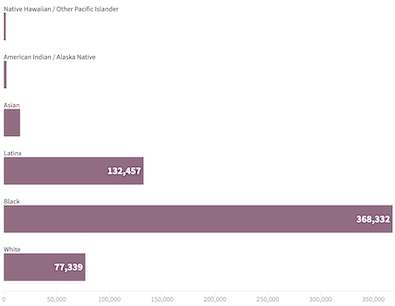
* 2019 stops per 1,000 drivers and citations per 1,000 stops…
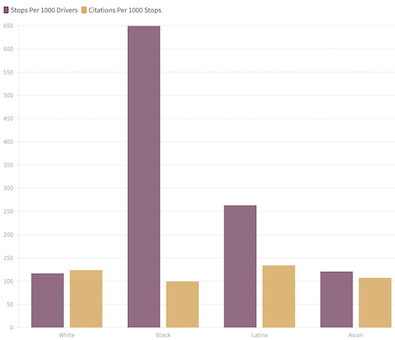
* “Traffic stops have increased rapidly, with 2019 seeing more than half a million more stops than 2014″…
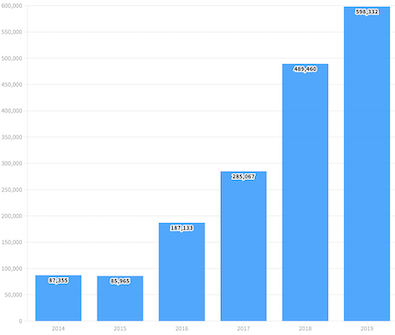
* “Black drivers have seen the largest overall increase since 2014. From 2018-2019, the greatest percentage increase was seen by Latinx drivers, who saw stops increase by 27%”…
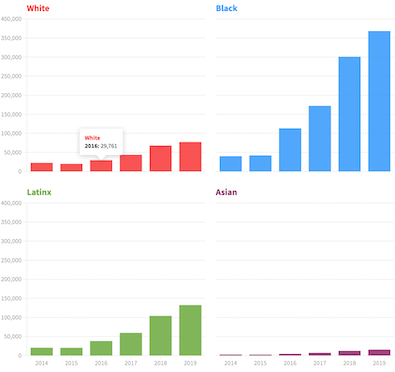
* Check out Houston…
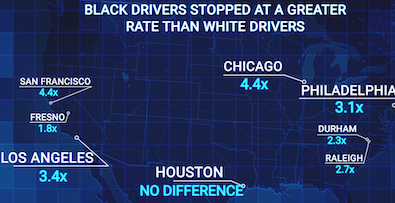
























- walker - Friday, Sep 11, 20 @ 9:51 am:
Oh, but there’s no “systemic racism” in policing. /s
- Montrose - Friday, Sep 11, 20 @ 9:52 am:
I wish this data was surprising. I’m very curious about Houston. Do they have better systems and policies in place?
- Fav Human - Friday, Sep 11, 20 @ 9:54 am:
The further south you go the better it gets
SF just as bad
- Nummy yummy - Friday, Sep 11, 20 @ 9:59 am:
What communities and police districts have the greatest number of police assigned to work and patrol? Do they concentrate more police in high crime areas?
- Cassandra - Friday, Sep 11, 20 @ 10:13 am:
I just don’t understand why they can’t fix the racial disparities. The police department is a bureaucracy. There are rules and regulations that are supposed to limit personal discretion in carrying out one’s duties. How hard could it be for the police management to address this problem.
And why the increase in traffic stops. Are people really driving that much worse than a few years ago. Or is this another unfortunate example of the growth of our surveillance state. Who, exactly, benefits from this?
- Jocko - Friday, Sep 11, 20 @ 10:14 am:
My only thought (I should say, hope) is that these traffic stops occurred during unconventional hours (let’s say, 11p - 5am) and have more to do with job opportunities than ill-intent by police.
- Stu - Friday, Sep 11, 20 @ 10:14 am:
The common argument is always, “well, they must be doing something wrong to get pulled over so much” (speeding, reckless driving, etc.)
The citations per 1,000 stops kinda blows that theory out of the water.
- Steve Rogers - Friday, Sep 11, 20 @ 10:19 am:
Is anyone surprised? And in other news, the sun rises in the east and sets in the west.
- Not This Time - Friday, Sep 11, 20 @ 10:27 am:
How to fix this: don’t flood high crime neighborhoods with cops.
- Rich Miller - Friday, Sep 11, 20 @ 10:29 am:
===don’t flood high crime neighborhoods with cops===
Why do so many white people always find an excuse for this stuff?
- Amalia - Friday, Sep 11, 20 @ 10:30 am:
there may well be a disparity but geography must be considered. there is a disparity in the number of police assigned and to where they are assigned. some neighborhoods are far quieter than others in not just police respect but traffic. there are geographic reasons for differences. the entire city’s numbers cannot be considered in one pot. you can and should make the same geographic analysis for sexual assault and murder. map the tickets, map the crimes.
- 1st Ward - Friday, Sep 11, 20 @ 10:40 am:
2014 appears to have a ~2x difference with 2019 at 4.4x. The increases in stops since 2016 was disproportionate among one groups even though they increased across all.
What changed within the department starting in 2016? Especially with the alternatives to driving that we have today in the city compared to 2016 you would think stops would be flat to down. Population trends don’t support more stops either.
- JS Mill - Friday, Sep 11, 20 @ 10:43 am:
=The common argument is always, “well, they must be doing something wrong to get pulled over so much” (speeding, reckless driving, etc.)
The citations per 1,000 stops kinda blows that theory out of the water.=
I would like to think that the police are simply stopping people for legal reasons, and stopping the people that are in violation of some rule or law without regard to race.
I would like to think that. But I cannot because it is obviously not the case.
- N/N mbsr - Friday, Sep 11, 20 @ 10:47 am:
No one wants to see shootings and violent crime.
The mayor clamors for action. The police chief knows there is nothing he can do about it but has to look like he’s doing something. He directs his minions to put cops in the high crime areas. The minions create spread sheets to tally their efforts in reducing violence. The cops know what is being counted (I’m sure there was a column for traffic stops). They need to show that they support the mission so they stop a car or two a shift for something easy like a headlight out. They write a warning and the process repeats next shift.
Throw citation rates out the window. A lot of cops write warnings for things they should write tickets for. Why? Because they work midnights and don’t want the hassle of waking up in the middle of their sleep period to go to court for a defendant to not show up or have the judge dismiss it. Even if you aren’t working a midnight shift, it’s not long before you see the futility of writing traffic tickets. A warning checks fits in to the spreadsheet I mentioned above.
CPD is nearly impossible to defend in most ways but blaming rank and file cops for who they are stopping in this article is a miss.
- 1st Ward - Friday, Sep 11, 20 @ 10:48 am:
“Or is this another unfortunate example of the growth of our surveillance state. Who, exactly, benefits from this?”
Correlation could be the red light ticket scandal. Lawsuit was brought in March 2015 and settlement reached in July 2017. City needed to replenish fines and fees brought by these tickets through traffic enforcement?
https://www.chicagotribune.com/politics/ct-rahm-emanuel-red-light-tickets-lawsuit-settlement-met-20170720-story.html
- IgorStravinski - Friday, Sep 11, 20 @ 10:54 am:
Sorry Rich, Chicago is a segregated city and police are sent to high crime areas, the majority of which happen to be in black neighborhoods.
It would be interesting to see what the statistics are of blacks or other people of color being pulled over in predominantly white neighborhoods, like yours.
If it were found that POC were pulled over at a disproportionate rate in neighborhoods like yours, then you and everyone else commenting here might have an argument.
- charles in charge - Friday, Sep 11, 20 @ 10:59 am:
It’s no coincidence that the traffic stops soared after CPD was forced to curtail stop and frisk of pedestrians, which was also racist as heck.
- Oswego Willy - Friday, Sep 11, 20 @ 11:00 am:
=== If it were found that POC were pulled over at a disproportionate rate in neighborhoods like yours, then you and everyone else commenting here might have an argument.===
You are suggesting persons of color aren’t arbitrary pulled over in predominantly white neighborhoods?
That’s an odd argument since that *does* happen, and it takes away the thought of what you *don’t* want to argue here.
Your deflection is noted, and it’s not a very good one unless you think your ridiculousness isn’t happening… anyway.
- @misterjayem - Friday, Sep 11, 20 @ 11:03 am:
“What communities and police districts have the greatest number of police assigned to work and patrol? Do they concentrate more police in high crime areas?”
“there may well be a disparity but geography must be considered. there is a disparity in the number of police assigned and to where they are assigned.”
From the research:
Why are police in high crime areas stopping Black drivers who haven’t committed any offense for which to cite them?
If a cop has been assigned to a high crime area, maybe that cop should concentrate on addressing actual wrong-doing.
Note: Driving while black is not wrong-doing.
– MrJM
- N/N mbsr - Friday, Sep 11, 20 @ 11:13 am:
@1stWard
Why then would they be writing so many warnings? No revenue there.
This is indeed a symptom of a greater problem. It is an unfortunate result of poor policing practices and procedures in the city of Chicago. It is also a result of a failed criminal court system.
The solution, if we ever get there, is a combination of making the streets safe and removing bad actors at least temporarily. It’s social services. It’s community and it’s jobs. But most importantly all of the components need to quit pretending that they are the only part of the equation that matters. They need to work in unison. Looking in from the outside, the solutions look more like warring factions than problem solvers.
Until all that happens you will just get more of the same.
- Rich Miller - Friday, Sep 11, 20 @ 11:14 am:
What MrJM said.
- JS Mill - Friday, Sep 11, 20 @ 11:16 am:
MrJM wins the internet today. Exceptionally well stated sir.
- Back to the Future - Friday, Sep 11, 20 @ 11:21 am:
I used to live in a area years ago that had a lot of public safety officers. I remember getting pulled over for going through a stop sign (to my benefit it was a mistake to put a stop sign on that corner). When I heard the siren I pulled over and the police officer rolled down his window and asked me if I knew I went right through the sign without stopping. I was already getting out my license when he said “could you watch out for the sign next time”. Of course, I said yes and he smiled and said be careful as he drove off. I suspect most people my age has had similar experiences.
The increase in tickets was amazing along with the high percentage of Black citizens getting written up. Something is obviously wrong. Now tickets are like red light cameras and are just revenue sources (particularly in the suburbs).
That’s not to say CPD doesn’t have problems including having police officers work 12 hour days and not having a contract for three years.
Hopefully a new contract and better management will help.
- N/N mbsr - Friday, Sep 11, 20 @ 11:27 am:
Well then, it’s settled.
Glad I stopped by.
- Pot calling kettle - Friday, Sep 11, 20 @ 11:29 am:
===police are sent to high crime areas, the majority of which happen to be in black neighborhoods===
Citations, please.
Also, you may wish to review research on which crimes are investigated and prosecuted (and who is investigated and prosecuted for similar infractions) and the racial biases within the system.
- What's in name? - Friday, Sep 11, 20 @ 11:29 am:
Do they track the race of the officers making the stop? Are the white cops stopping black folks? Are black cops stopping black folks? If black cops are disproportionately stopping black drivers I would be inclined to think there is something else going on besides out right racism.
- Homebody - Friday, Sep 11, 20 @ 11:30 am:
more support for MrJM here.
We saw the same results with stop and frisk in NYC. All studies show that black and white populations use drugs at approximately the same rates, but white people who were stopped had drugs or drug paraphernalia on them at far higher rate. Either cops were just super good at picking out white drug users, or they were indiscriminately stopping black people.
- Candy Dogood - Friday, Sep 11, 20 @ 11:42 am:
===Why do so many white people always find an excuse for this stuff? ===
I’ll take a stab at this even though it may have been meant to be rhetorical, but I think it ties into the concept that is described as “white fragility.” This might be too simple of an explanation, but white fragility is basically the idea that because of white privilege — which is the benefit or lack of disadvantage that white folks have in our society due to their perceived whiteness — white people generally don’t have to spend as much time thinking about, discussing, or otherwise dwelling on race.
A good example is traffic stops — white folks get pulled over at lower rates than black folks because of their whiteness, and white folks can easily be unaware that their experience is different than that of non-whites in their community because they don’t have to think about it.
In addition to not being required to ask whether or not they were pulled over exclusively for being white, since they are incredibly likely to receive a citation when they are pulled over their privilege also prevents them from being able to personally experience what non-whites in the society experience.
So — even though there’s lots of data and articles about this data, because white folks are less likely to associate race having anything to do with traffic stops because of their personal experiences, and they are less likely to experience unnecessary stops or other harassment, when a topic like racial bias in police traffic stops get brought up they are unprepared to discuss the issue on several different levels.
Due to the lack of familiarity with the subject matter white folks are more likely to react negatively to the conversation topic, more likely to search for reasons that make them more comfortable receiving the information, and much more likely to try to change the topic or otherwise distract from the feelings making them uncomfortable.
A core component of the concept of white fragility is that white folks can unconsciously have these reactions, just as they can unknowingly benefit from being in a society with structural racism and culture that significantly impacts the ability to have bias regarding race.
A book diving into this topic was published a couple of years ago — I like to think that if it’d been published say, 6 years ago, there would have been a much broader social conversation about it — especially with reaction from the folks that wind up being technically “pro-racist.”
I sometimes think of it as white fragility being another way to describe a white person being “triggered” by a conversation about racial discrimination, even if they aren’t being specifically implicated as being racist. I also think by calling it white fragility the term creates a specific litmus test all by itself.
Though folks on the right side of the aisle are more likely to have a strong reaction to the term, I think the overall idea of white fragility may be more significant to conversations about folks that fall into the “social justice warrior” category. (I’m took a moment before deciding that was the most accurate term I could use). I realized when I learned about white fragility that almost every single guided conversation, or unguided conversation, that discusses white privilege leads to the discussion of “other kinds of privilege.” When I reviewed the essay about unpacking the knapsack of white privilege, I realized the intention to discuss types of privileges people have in society was supposed to be encouraging participants to talk about — their — white privilege. The essay includes a list by the author of many times of white privilege the author enjoys. In my opinion white fragility results in that conversation being derailed by people interpreting “other kinds of privilege” as being an opportunity to target other groups that might also have social privilege in our society due to bias.
Hence you get straight privileged, cisgender privilege, Christian privilege, First World privilege, female privilege, and other kinds of social privilege being brought up in a setting that was intended to explore and unpack the white privilege that people are not necessarily consciously aware of because white fragility causes the desire to shift the focus away from a topic that white folks are uncomfortable with.
A general discussion of social privilege is not a bad thing, but if the point of the conversation was to help make someone aware of the white privilege they experience letting them shift the target of the conversation to a different social privilege is letting them embrace their white fragility.
- The W.A. - Friday, Sep 11, 20 @ 11:50 am:
Unclear on the concept of “systemic?”
- Minor stops - Friday, Sep 11, 20 @ 12:24 pm:
I would assume that if large numbers were being pulled over for doing nothing wrong that this would have been a huge story. I’m guessing that virtually every one of these stops was for something “wrong”.
Cops often will write warnings or even give verbal warnings. “Your tail light is out” is a pretty nice thing to be told. Do people want those people not to be pulled over or do they want them ticketed?
I’d love to know how many stops are for vehicle issues like that. My guess is that those would affect poor people disproportionately and, without knowing the numbers, affect blacks disproportionately.
I’m also a little bit mystified at the blowback on the geography issue. It just seems obvious that areas with higher crime rates would have more police and therefore more stops. If those higher crime areas are in areas that are predominantly black, that could account for some of the disparity.
- Froganon - Friday, Sep 11, 20 @ 12:51 pm:
What MJM said, if Chicago cops spent less time stopping black dirvers for “tail light/headlight malfunction” maybe they could improve their statistics on solving or even preventing actual crimes. Police reform is beyond overdue. Chicago has one of the highest percapita police rates in the country. Reduce the number of cops and increase the number of mental health and social workers. We need people with a different set of work skills.
- Dotnonymous - Friday, Sep 11, 20 @ 12:57 pm:
Modern policing is based on racism…for a fact.
- Big Jer - Friday, Sep 11, 20 @ 1:07 pm:
===If it were found that POC were pulled over at a disproportionate rate in neighborhoods like yours, then you and everyone else commenting here might have an argument.===
For all the comments like above that are making excuses i.e. more police in high crime areas being in black neighborhoods, geography, etc here you go:
Several years ago I was taking evening classes for a Masters in Counseling at National Louis University in Wheeling, IL. A few of my classmates were African American women who discussed being frequently pulled over for Driving While Black in Wheeling and elsewhere.
They were doing nothing but driving home after class late in the evening. These were professional college educated women pursuing a Masters degree in order to help others and were still followed by the police or pulled over for no reason. That is pathetic and wrong and needs to be called for what it is, racial profiling.
- Owl - Friday, Sep 11, 20 @ 1:13 pm:
Former Houstonian
It never felt as racially polarized as Chicago. We’ve been celebrating Juneteenth for decades, which originated in nearby Galveston.
The last Mayoral race I could remember around 2015 revolved around potholes and hurricane preparedness.
Houston has a majority-white core surrounded by Black and brown communities. So there are plenty of opportunities to ignore the white drivers. Or maybe there just not pulling Black drivers over in their own neighborhoods, either.
In any case, not surprising.
- Guzzlepot - Friday, Sep 11, 20 @ 1:57 pm:
What would be really interesting is the stats further broken down by age. The way the stats are now they include everyone from the sixteen year-old male teenager through the sixty-year old grandmother. I would love to see the state for African-American males between the ages of sixteen and forty.
- IgorStravinsky - Friday, Sep 11, 20 @ 2:05 pm:
“You are suggesting persons of color aren’t arbitrary pulled over in predominantly white neighborhoods?“
No, I’m not suggesting that at all. What I’m saying is, as someone else has suggested, geography is a key component to the argument.
In fact, I’m pretty certain that black people do get pulled over for being black all the time. But as someone said anecdotally, in places like Wheeling, or even perhaps in the loop, where many of our ivory tower readers are chiming in from.
In order to determine a bias, let’s see real data based on geography. Hypothetically, if police over 100 cars at 76th and and Halsted in a month long period, statistically speaking, and based on the makeup of the community, the overwhelming majority would be black.
- Oswego Willy - Friday, Sep 11, 20 @ 2:08 pm:
=== In order to determine a bias, let’s see real data based on geography.===
Friend, heat up another hot pocket on the dorm room, you’ve already undercut your worried troll premise.
=== What I’m saying is, as someone else has suggested, geography is a key component to the argument.
In fact, I’m pretty certain that black people do get pulled over for being black all the time.===
I’ll leave you to your arguing with yourself.
Let me know how it goes.
- Minor stops - Friday, Sep 11, 20 @ 2:19 pm:
“I’ll leave you to your arguing with yourself.
Let me know how it goes.”
Is this really your argument? That’s some A level reasoning.
Please go back and read his point. I truly hope you’re not incapable of making the distinction between acknowledging a problem and trying to ascertain the extent of the problem.
- Oswego Willy - Friday, Sep 11, 20 @ 2:24 pm:
=== Please go back and read his point.===
(Sigh)
=== In order to determine a bias, let’s see real data based on geography.===
After eating the hot pocket and making sure the RA isn’t checking dorm rooms…
=== What I’m saying is, as someone else has suggested, geography is a key component to the argument.
In fact, I’m pretty certain that black people do get pulled over for being black all the time.===
Again, I’ll be curious which side wins, since arguing with yourself isn’t making any points.
- Enviro - Friday, Sep 11, 20 @ 3:28 pm:
Sometimes when a police officer gives a warning instead of a ticket it could be an act of kindness. The police officer may want to give the driver another chance.
Under Illinois Administrative Code, Title 92, Chapter 2, Section 1040.30, a person who racks up three traffic ticket convictions in 12 months will have his or her driver’s license suspended.
- Pundent - Friday, Sep 11, 20 @ 3:57 pm:
=Sometimes when a police officer gives a warning instead of a ticket it could be an act of kindness.=
And sometimes police pull people over because they look suspicious. And sometimes being African American is enough to raise suspicion. We have a long history of racial profiling in this country so none of this should surprise us. Just because you can’t “see” this happening doesn’t mean it doesn’t exist. In fact it’s these types of actions that are at the root of inequality in our criminal justice system.